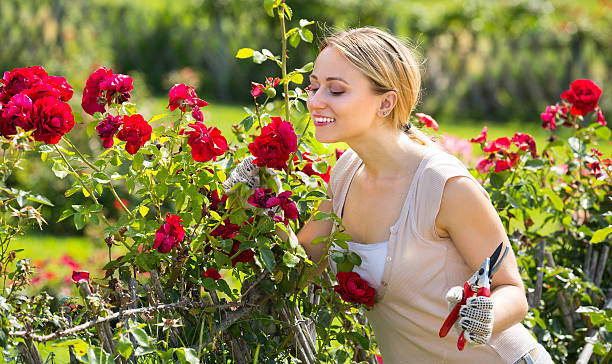
Roses, with their timeless beauty and enchanting fragrance, have been cherished across cultures and centuries. In India, the cultivation of roses has a rich history, deeply intertwined with traditions, festivals, and the nation’s diverse landscape. Whether adorning gardens, religious ceremonies, or serving as a symbol of love, roses hold a special place in the hearts of Indians. This article delves into the art of rose cultivation in India, exploring the different varieties, cultivation techniques, and cultural significance of these blooming beauties.
Additionally, it touches upon the role of agricultural machinery such as the Kubota mini Tractor, emphasizing the importance of advanced equipment in modern farming practices. For those considering venturing into rose cultivation, the article also provides insights into financial planning by mentioning tools like the Tractor Loan EMI calculator to assist in making informed decisions about agricultural investments.
Varieties of Roses in India
India boasts a vast array of rose varieties, each with its unique characteristics, colors, and fragrances. The country’s diverse climate allows for the cultivation of both temperate and tropical roses. Some popular varieties cultivated in India include:
- Hybrid Tea Roses: Known for their classic bud shape and vibrant colors, hybrid tea roses are a favourite among rose enthusiasts. Varieties like ‘Queen Elizabeth’ and ‘Mr. Lincoln’ thrives in the temperate regions of northern India.
- Climbing Roses: Perfect for arches, trellises, and fences, climbing roses add vertical elegance to gardens. Varieties such as ‘Golden Showers’ and ‘Joseph’s Coat’ are well-suited for the Indian climate.
- Miniature Roses: Ideal for small gardens or container gardening, miniature roses, like ‘Cupcake’ and ‘Sunblaze,’ offer the same charm as their larger counterparts but in a compact form.
- Polyantha Roses: These clusters of small, colourful looms are well-suited for mass planting. Varieties like ‘The Fairy’ and ‘Margo Koster’ bring a delightful profusion of flowers to Indian gardens.
Cultivation Techniques Of Roses
Successful rose cultivation in India requires careful attention to soil preparation, planting, watering, and pest control. Here’s a brief guide to cultivating roses:
- Preparing the Soil: Create an optimal environment for thriving roses by planting them in well-draining soil with a pH of 6.0-6.5. Boost soil structure and fertility with organic elements like well-decomposed compost. Whether tending to a garden or a larger agricultural space, consider using the Sonalika Tractor. For financial planning, leverage a Tractor Loan EMI calculator to make informed decisions and seamlessly integrate modern agricultural technology into your rose cultivation.
- Planting: Choose healthy, disease-free rose plants from reputable nurseries. Dig a hole twice as wide as the root ball and deep enough for the plant to sit at the same level as it was in the pot. Space plants adequately to allow good air circulation.
- Watering: Roses need consistent moisture, especially during the growing season. Water at the base of the plant in the early morning to prevent fungal diseases. Avoid overhead watering, which can lead to leaf spot.
- Fertilizing: Feed roses with a balanced fertiliser during the growing season, typically in spring and late summer. Organic options like well-rotted manure or compost can also be beneficial.
- Pruning: Regular pruning encourages healthy growth and abundant flowering. Remove dead or diseased wood and shape the plant to promote air circulation. Different types of roses may require specific pruning techniques.
- Pest and Disease Control: Keep an eye out for common rose pests such as aphids, mites, and caterpillars. Neem oil and insecticidal soaps are effective organic solutions. Fungal diseases like black spot can be prevented by providing good air circulation and avoiding overhead watering.
Cultural Significance of Roses in India
Roses hold a significant place in Indian culture, transcending their role as mere ornamental plants. Here are some ways in which roses are culturally relevant in India:
- Religious and Spiritual Significance: Roses are often used in religious ceremonies and rituals across various faiths in India. The petals are scattered as offerings, and the fragrance is believed to symbolise purity and divinity.
- Festivals and Celebrations: Roses play a central role in festivals and celebrations, adorning homes, temples, and public spaces. During events like Diwali, weddings, and cultural festivals, roses are used to create intricate floral decorations.
- Symbol of Love and Romance: The universal symbol of love, roses are an integral part of Indian weddings and romantic gestures. Red roses, in particular, are exchanged between couples as a token of love and affection.
- Ayurvedic and Medicinal Applications: Within Ayurveda, the ancient Indian medicinal system, roses are esteemed for their cooling properties. The utilisation of rose water, obtained through the distillation of rose petals, extends to skincare practices, offering diverse health advantages.
Conclusion
Mastering the cultivation of roses in India involves a harmonious fusion of horticultural skill and cultural importance. Across the lively gardens of Kashmir to the tropical vistas of Kerala, roses flourish in the varied climates of the nation.
Whether you possess seasoned gardening expertise or are a budding enthusiast, nurturing roses in India proves to be a gratifying endeavour, establishing a profound connection with a tapestry woven with tradition and the inherent beauty of nature. It’s time to get hands-on, delve into the soil, and watch the timeless charm of roses unfold in your garden.



